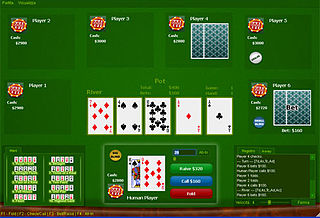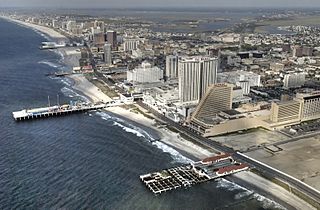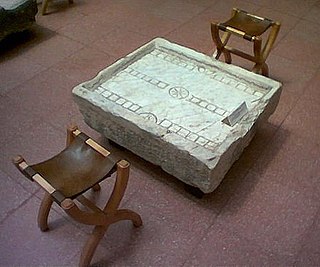Related Research Articles

A game of chance is in contrast with a game of skill. It is a game whose outcome is strongly influenced by some randomizing device. Common devices used include dice, spinning tops, playing cards, roulette wheels, numbered balls, or in the case of digital games random number generators. A game of chance may be played as gambling if players wager money or anything of monetary value.

A bookmaker, bookie, or turf accountant is an organization or a person that accepts and pays out bets on sporting and other events at agreed-upon odds.

Gambling in Macau has been legal since the 1850s when the Portuguese government legalised the activity in the autonomous colony. Since then, Macau has become known worldwide as the "Gambling capital of the world". It is the only place in China where casino gambling is legal.

Online poker is the game of poker played over the Internet. It has been partly responsible for a huge increase in the number of poker players worldwide. Christiansen Capital Advisors stated online poker revenues grew from $82.7 million in 2001 to $2.4 billion in 2005, while a survey carried out by DrKW and Global Betting and Gaming Consultants asserted online poker revenues in 2004 were at $1.4 billion. In a testimony before the United States Senate regarding Internet Gaming, Grant Eve, a Certified Public Accountant representing the US Accounting Firm Joseph Eve, Certified Public Accountants, estimated that one in every four dollars gambled is gambled online.
Online casinos, also known as virtual casinos or Internet casinos, are online versions of traditional casinos. Online casinos enable gamblers to play and wager on casino games through the Internet. It is a prolific form of online gambling.
In computing, Internet geolocation is software capable of deducing the geographic position of a device connected to the Internet. For example, the device's IP address can be used to determine the country, city, or ZIP code, determining its geographical location. Other methods include examination of Wi-Fi hotspots, a MAC address, image metadata, or credit card information.
Online gambling is any kind of gambling conducted on the internet. This includes virtual poker, casinos, and sports betting. The first online gambling venue opened to the general public was ticketing for the Liechtenstein International Lottery in October 1994. Today, the market is worth around $40 billion globally each year, according to various estimates.

In the United States, gambling is subject to a variety of legal restrictions. In 2008, gambling activities generated gross revenues of $92.27 billion in the United States.
Playtech plc is a gambling software development company founded in 1999. The company provides software for online casinos, online poker rooms, online bingo games, online sports betting, scratch games, mobile gaming, live dealer games and fixed-odds arcade games online. It is listed on the London Stock Exchange and is a constituent of the FTSE 250 Index.

bwin Interactive Entertainment AG, formerly known as Betandwin, is an Austrian online betting brand acquired by Entain PLC. The group operated under international and regional licences in countries like Gibraltar, the Amerindian reserve of Kahnawake (Canada), and Belize; and Germany, Italy, Mexico, Croatia, Austria, France, and the United Kingdom in Europe. Bwin offered sports betting, poker, casino games, and soft and skill games, with most revenue coming from poker and sports betting. Bwin had over 20 million registered customers in more than 25 core markets. Competence centres were located in Vienna, Stockholm, and Gibraltar.
Mobile gambling refers to playing games of chance or skill for money by using a remote device such as a tablet computer, smartphone or a mobile phone with a wireless internet connection. Over a hundred mobile casinos were operating as of December 2013, with most of the big casino operators in gambling now providing a mobile platform for their player base.

The Unlawful Internet Gambling Enforcement Act of 2006 (UIGEA) is United States legislation regulating online gambling. It was added as Title VIII to the SAFE Port Act which otherwise regulated port security. The UIGEA prohibits gambling businesses from "knowingly accepting payments in connection with the participation of another person in a bet or wager that involves the use of the Internet and that is unlawful under any federal or state law." The act specifically excludes fantasy sports that meet certain requirements, skill games, and legal intrastate and intertribal gaming. The law does not expressly mention state lotteries, nor does it clarify whether interstate wagering on horse racing is legal.
Gambling in India varies by state; states in India are entitled to formulate their own laws for gambling activities. Some states like Goa have legalised casinos. Common gambling activities like organized betting are restricted except for selective categories including lottery and horse racing.
Gambling in Pennsylvania includes casino gambling, the Pennsylvania Lottery, horse racing, bingo, and small games of chance conducted by nonprofit organizations and taverns under limited circumstances. Although casino gaming has been legal for less than two decades, Pennsylvania is second only to Nevada in commercial casino revenues.
Gambling in France holds a current legal status.

Gambling in New Jersey includes casino gambling in Atlantic City, the New Jersey Lottery, horse racing, off-track betting, charity gambling, amusement games, and social gambling. New Jersey's gambling laws are among the least restrictive in the United States. In 2013, the state began to allow in-state online gambling. Five years later, the state won a lawsuit that dismantled Nevada's monopoly on legal sports betting.

Gambling in Italy has existed for centuries and has taken on many forms. Its dates back to the days of the Roman Empire, when the predecessor of the modern game of backgammon, Ludus Duodecim Scriptorum, became popular among Roman legionnaires. It is also due to them that the game came to other European countries.

888poker, formerly Pacific Poker, is an international online poker brand owned by Evoke plc. It was founded in 2002, and is headquartered in Gibraltar.
Gambling in Turkey is highly regulated. Turkey banned casinos in 1998, and it banned non-state online gambling in 2006. A state lottery and betting services exists, however, and has some online gambling, and illegal gambling continues to persist.

Gambling in China is illegal under Chinese law and has been officially outlawed since the Communist Party took power in 1949. Any form of gambling by Chinese citizens, including online-gambling, gambling overseas, opening casinos overseas to attract citizens of China as primary customers, is considered illegal. In practice however, Chinese citizens participate in state-run lotteries, regularly travel to legal gambling centers overseas or in the special administrative regions of Hong Kong and Macau and access gaming through offshore based proxy betting and online gambling companies.
References
- ↑ King, Kevin F. (2009-07-14). "Geolocation and Federalism on the Internet: Cutting Internet Gambling's Gordian Knot". Columbia Science and Technology Law Review. SSRN 1433634.
- ↑ Beem, Betsi; Mikler, John (September 2011). "National regulations for a borderless industry: US versus UK approaches to online gambling". Policy and Society. 30 (3): 161–174. doi: 10.1016/j.polsoc.2011.07.001 . ISSN 1449-4035. S2CID 153717027.
- ↑ Griffiths, Mark (2004-01-01). Internet Gambling: Issues, Concerns, and Recommendations. Vol. 6.
- ↑ Marketa, Trimble (2012). "Proposal for an International Convention on Online Gambling". Scholarly Commons @ UNLV Law.
- ↑ fun88 Complete Review
- ↑ "FAQ About How Geolocation Technology Works In New Jersey". NJ Gambling Websites. 2018-04-09. Retrieved 2018-10-06.
- ↑ Abdou, Abdelrahman; Matrawy, Ashraf; C. van Oorschot, Paul (2014-12-23). "Location verification on the Internet: Towards enforcing location-aware access policies over Internet clients". 2014 IEEE Conference on Communications and Network Security. pp. 175–183. CiteSeerX 10.1.1.648.45 . doi:10.1109/CNS.2014.6997484. ISBN 978-1-4799-5890-0. S2CID 16072177.
- ↑ "If I have remote desktop software, such as LogMeIn or GoToMyPC, actively running on my laptop or desktop, can I still be accurately geo-located?". CaesarsCasino.com. Archived from the original on 2023-02-21. Retrieved 2018-10-15.
- ↑ "WV Mobile Sports Betting Just Weeks Away, Hollywood Casino Exec Says". Legal Sports Report. 2018-09-28. Retrieved 2018-10-06.